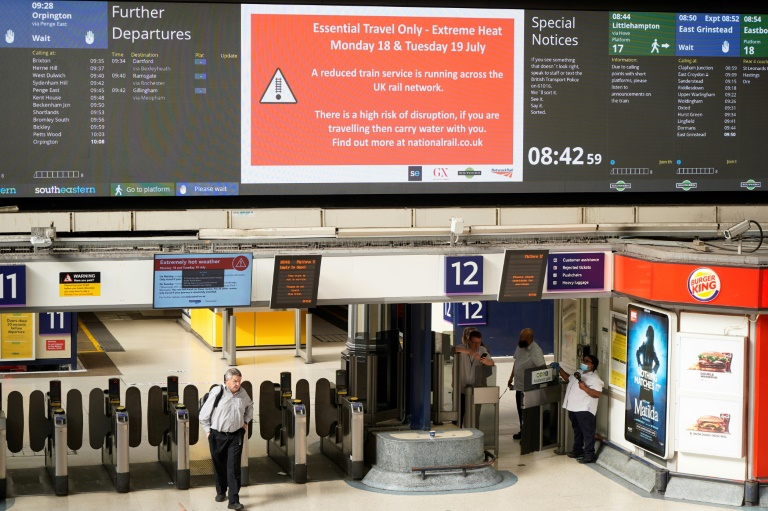Britain and France were in the grip of a fierce heatwave on Monday facing record temperatures as southwest Europe wilted under a scorching sun and ferocious wildfires devoured more forests.
Forecasters in Britain warned of havoc in a country unprepared for the onslaught of extreme heat that authorities said was putting lives at risk.
Temperatures climbed to 37.5 Celsius (99.5 Fahrenheit) at Kew Gardens in southwest London by 3:00 pm (1400 GMT), nudging towards the country’s all-time record of 38.7C.
Air traffic was suspended at Luton airport, north of London, due to “defects” on the runway
Meteorologists said the 40C mark could be breached for the first time by Tuesday, with climate change blamed and predictions of more frequent and intense episodes of extreme weather in years to come.
Across the Channel in France, a host of towns and cities recorded their highest ever temperatures on Monday, the national weather office said.
The mercury hit 39.3 Celsius (102.7 Fahrenheit) in Brest on the Atlantic coast in the far northwest of the country compared with a previous record of 35.1 C from 2002.
Saint-Brieuc on the Channel coast sizzled in 39.5 C compared with a previous record of 38.1 C, while western Nantes recorded 42 C, beating a previous high of 40.3 C set in 1949.
“In some southwestern areas, it will be a heat apocalypse,” meteorologist Francois Gourand told AFP.
French firefighters were struggling to contain two massive fires in France’s southwest that have created apocalyptic scenes of destruction.
For six days, armies of firefighters and a fleet of waterbombing aircraft have struggled against blazes that have mobilised much of France’s entire firefighting capacity.
Forecasters have put 15 French departments on the highest state of alert for extreme temperatures, including in the western Brittany region where the Atlantic coastal city of Brest was expected to hit 40C on Monday — nearly twice its usual July temperature average.
In Ireland, the mercury hit 33.0C in Phoenix Park, Dublin — 0.3C below the all-time record set way back in 1887, Met Eireann said.
The European heatwave, spreading north, is the second to engulf parts of the southwest of the continent in recent weeks.
Record temperatures were recorded in the Netherlands (33.6C) with warnings the mercury could reach 38-39C on Tuesday.
Neighbouring Belgium also expected temperatures of 40C and over.
European Commission researchers meanwhile said nearly half (46 percent) of EU territory was exposed to warning-level drought.
Eleven percent was at an alert level and crops were already suffering from lack of water.
– ‘Heat apocalypse’ –
Blazes in France, Greece, Portugal and Spain have destroyed thousands of hectares of land and forced thousands of residents and holidaymakers to flee.
An area of nine kilometres (5.5 miles) long and eight kilometres wide was still ablaze near France’s Dune de Pilat, Europe’s highest sand dune, turning picturesque landscapes, popular campsites and pristine beaches into a scorching mess.
A total of 8,000 people were being evacuated from near the dune Monday as changing winds blew thick smoke into residential areas, officials said.
“The smoke is toxic,” firefighter spokesman Arnaud Mendousse told AFP. “Protecting the population is a matter of public health.”
A nearby zoo in Archachon evacuated its more than one thousand animals, sending them to other facilities to escape the smoke.
The evacuations added to the 16,000 tourists or residents already forced to decamp in France, many to emergency shelters.
In Spain, fire burning in the northwestern province of Zamora claimed the life of a 69-year-old shepherd, regional authorities said.
The previous day a fireman died in the same area.
Later Monday it was reported that an office worker in his fifties had died from heatstroke in Madrid.
Authorities have reported around 20 wildfires still raging from the south to Galicia in the far northwest, where blazes have destroyed around 4,500 hectares (more than 11,000 acres) of land.
In Portugal, almost the entire country remained on high alert for wildfires despite a slight drop in temperatures which had hit 47C — a record for the month of July — last Thursday.
– ‘Get on with it’ –
Fires have killed two, injured around 60 and destroyed between 12,000 and 15,000 hectares of land in Portugal.
In Britain, the government, already on the ropes after a series of scandals that forced Prime Minister Boris Johnson to quit, drew fresh criticism for failing to take the situation seriously enough.
Johnson was criticised for failing to attend an emergency contingencies meeting on Sunday and instead hosting a farewell party at his state-funded country retreat.
Deputy prime minister Dominic Raab also drew flak from frontline medics by appearing to minimise the threat from the extreme heat after he told Britons to “enjoy the sunshine”.
The Sun tabloid headlined its coverage of the heat “British Bake Off”, observing that the “scorcher” was making the UK hotter than Ibiza where temperatures were a comparatively paltry 30C.
“It is a bit frightening,” Karina Lawford, 56, told AFP as she took a stroll by the sea in Tankerton on the north Kent coast, saying the heat reminded her of Australia where she lives.
Britain’s chief meteorologist Paul Davies said the heatwave was “entirely consistent with climate change”, telling Sky News the “brutality” of the heatwave was “astounding” but could become a regular occurrence by the end of the century.
Trains were cancelled and schools closed in affected areas.
But some like 64-year-old plumber Dave Williams urged people to “just get on with it”.
“It’s nothing to get excited about, is it really? If it isn’t Brexit or the weather we don’t know what else to talk about, do we?” he said.
And in Brighton, on England’s south coast, bank worker Abu Bakr put the heatwave in perspective.
“I come from Sudan,” he said. “Forty, forty-five degrees is just the norm. This is as good as it can be.”
burs-jh-phz/adp/pvh









